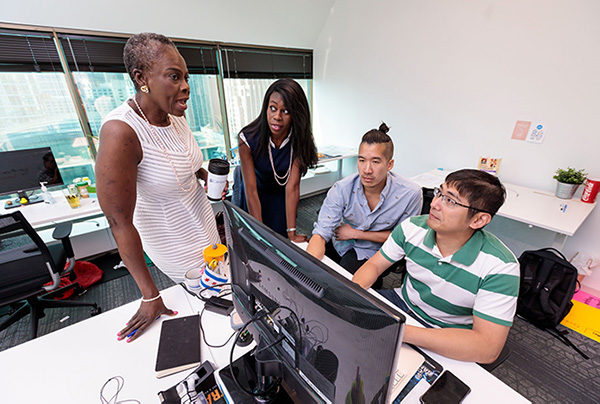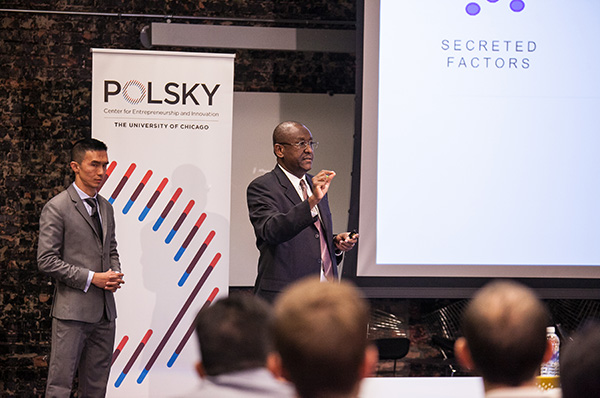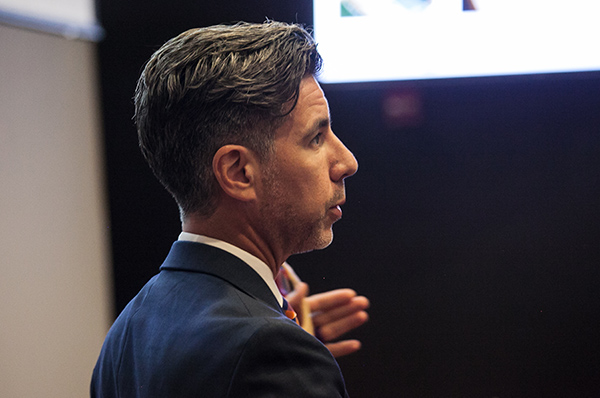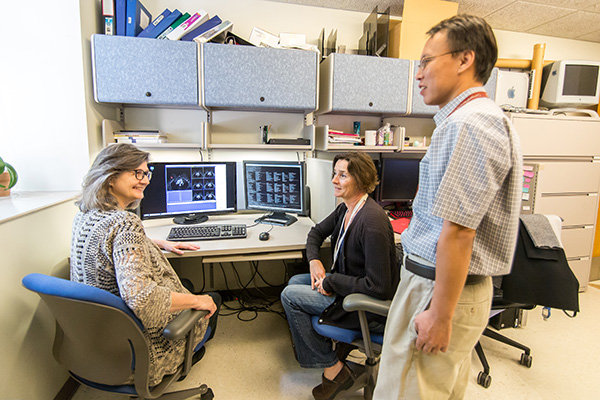UChicago researchers broaden impact by bringing scientific discoveries to market

Few people get a bigger whiff of the entrepreneurial spirit taking hold among biosciences faculty members than the Duchossois Family Institute: Harnessing the Microbiome and Immunity for Human Health.
The Duchossois Family Institute (DFI) was founded with a $100 million gift from The Duchossois Group Inc. Chairman and CEO Craig Duchossois; his wife, Janet Duchossois; and The Duchossois Family Foundation to accelerate research and interventions based on how the immune system, microbiome and genetics interact to maintain health. The entrepreneurial infrastructure includes commercialization specialists with a deep understanding of science and the path to market. Embedded within the DFI, they work closely with faculty and students to build strong patent applications and the relationships with investors and industry needed to successfully develop and license these technologies.
The Duchossois Family Institute
The new institute completes a pipeline that starts for some faculty with the Institute for Translational Medicine (ITM), a health research accelerator that offers seed funding and other support for UChicago researchers to explore dynamic ideas that could improve human health. The ITM provides a range of resources that enable scientists to do the research and get the early-stage data they need to attract investors and commercialize their work.
“The launch of the Duchossois Family Institute and Polsky Center’s new programs now gives our researchers with science-supported ideas someplace to go for health care startup expertise,” said Julian Solway, MD, director of the ITM and dean for translational medicine. “We’re thrilled to work with such great allies to speed the innovation pipeline at the University of Chicago.”
One year, four new companies
The approach is working. “Over the last year we’ve had tremendous success,” said Matt Martin, PhD, Polsky’s microbiome lead for technology commercialization. “We’ve now put together four companies that wouldn’t have existed without this new model.”
The newly created microbiome-focused companies reflect the institute’s mission to develop a new science of wellness aimed at preserving health, complementing medicine’s traditional focus on treating sickness and disease:
- AVnovum Therapeutics, Inc., based on the work of John Alverdy, MD, executive vice chair of surgery, is developing a platform to reduce the risk of infection and other surgical complications. Unlike antibiotics, the strategy will work cooperatively with, instead of against, the patient’s microbiome.
- Oxalo Therapeutics, based on the work of nephrologist Hatim Hassan, MD, PhD, is developing a first-in-class oral therapeutic to prevent kidney stones. The therapeutic targets recurring kidney stones, approximately 75 percent of which consist of calcium-oxalate mixtures.
This recent success prompted the creation of the Maryellen Giger, PhD, has a long and successful history in creating such ventures. Her experience as an innovator and entrepreneur dates to the late 1980s, when she and four UChicago colleagues developed systems for the computer-aided detection (CAD) of tumors in medical images. R2 Technology licensed their UChicago patents for the technology in 1993; five years later, it was the first company to gain approval from the U.S. Food and Drug Administration to use CAD for mammography screening. Quantitative Insights, Inc., the newest company based on Giger’s work, is distributing the first FDA-cleared computer-aided diagnosis platform incorporating machine learning for the evaluation of breast abnormalities.
Over the last year we’ve had tremendous success. We’ve now put together four companies that wouldn’t have existed without this new model.
As a student, Giger wondered why faculty members didn’t make their intellectual property freely available to everyone for the public benefit. “Then I learned that one should obtain a patent and license it to only one or two companies,” she said. “If everyone received the intellectual property for free, no one would invest the time and funding in translating it into a product, because it’s expensive to take a lab device through the FDA and into a commercial clinical product.”
When University intellectual property is protected and licensed to companies (including startups), everyone benefits. The revenue generated by these licenses is shared by the University and the innovators. Innovators receive revenue in recognition of their critical role in the discovery and to incentivize translational activity. The remainder is reinvested across the institution, including the innovators’ labs and departments to support ongoing research, and the Polsky Center to protect new intellectual property.
Start up — and out
Just as important, commercialization enables researchers to get their innovations out into the public more quickly and make a bigger impact on human health.
Staph infections kill an estimated 19,000 people annually and infect tens of thousands more. Olaf Schneewind, MD, PhD, chair of the Department of Microbiology, has been working for 15 years on a vaccine that could neutralize the scourge of Staphylococcus aureus, including antibiotic-resistant strains.
“That would be an extraordinary scientific victory,” he said.
ImmunArtes is the startup based on the work of Schneewind and his associates. Over the last two decades, Schneewind said, many large companies have found that maintaining their own research and development is less efficient than shifting that burden to startups, which take extraordinary risks in developing new technologies that could then be purchased at an early stage.
Schneewind has received more than $5 million from the National Institute of Allergy and Infectious Diseases, which also has assisted with product development. If sufficient private sector funding fails to come through, Schneewind may still be able to develop a vaccine on a shoestring budget with funding from the National Institutes of Health (NIH) — but it would take longer. “I see a path forward in this no matter what,” he said. “I’m committed to finishing.”
Kidney stones affect about one in five men and one in 11 women in this country. Oxalo Therapeutics seeks to bring an oral preventative of calcium oxalate kidney stones to market in the next seven or eight years, potentially bringing relief to patients with this painful condition. The company, co-founded by Hatim Hassan, MD, PhD, and Yang Zheng, a student at the University of Chicago Booth School of Business, recently was awarded $2.3 million through the NIH’s Small Business Technology Transfer program. Oxalo also advanced to the final round of the 2018 MassChallenge Boston — one of just two biotech startups among the 26 finalists. (A total of 128 startups, including ImmunArtes, were chosen to participate in the highly selective accelerator program out of more than 1,600 competitors worldwide.)
“If we are successful in developing this pill and lowering urine and blood oxalate, it will open the door for redefining the standard of care,” said Hassan, who worked closely with the Polsky Center’s Martin in launching his enterprise.
To market, to market
Samuel Volchenboum, MD, PhD, a pediatric oncologist and director of the Center for Research Informatics, has organized another resource for his colleagues.
Five years ago, Volchenboum co-founded Litmus Health to produce a data science platform for early-stage clinical trials and large-scale observational studies. Litmus focuses on measuring health-related quality of life using real-world data sets and streams. The company raised a small angel round of financing and is already profitable. Litmus also was just awarded a significant joint NIH-Small Business Innovation Research (SBIR) program grant to further its technology platform.
I’ve learned a whole lot along this journey that I’m eager to share with others ... these have been invaluable lessons
Some UChicago colleagues, Volchenboum said, are surprised when he suggests their ideas might present marketplace opportunities, while others have no idea how to get started.
“I’ve learned a whole lot along this journey that I’m eager to share with others — how to prototype and pilot, how to commercialize out of an academic environment, how to find your first customers, how to manage legal and regulatory constraints, and how to put the right team together — these have been invaluable lessons,” Volchenboum said. “To that end I’ve set up a working group here made up of about 25 people from around the medical center and the University where people can come and present their ideas and get candid feedback and advice on next steps.” His Data Use and Innovation Group brings together attorneys and specialists in compliance, privacy and security to discuss their projects.
Volchenboum also serves as faculty director of the relatively new master of science in biomedical informatics program at the University’s Graham School of Continuing Liberal and Professional Studies. One of the program’s first graduates, Melissa Byrn, developed FORESEEaBILL, a technology that automates the billing process for the various tests and procedures patients undergo during clinical trials.
Byrn is now director of innovation programs at the Booth School of Business in the Polsky Center. For her capstone project, she surveyed the clinical trial software landscape, identified a gap and then proposed her solution. She honed her idea through the Polsky Center’s Innovation Corps program, which empowers UChicago researchers and students to test the market potential of their STEM-related projects with National Science Foundation support.
She also met some students at the University of Chicago Booth School of Business who were aware of private-sector interest in health care technology. They formed a team that advanced to the finals of the Oncologist Olufunmilayo (Funmi) Olopade, MD, also leveraged the expertise of Chicago Booth students in launching CancerIQ, a company based on her cancer risk assessment tools. The company’s digital products make it easier for community-based physicians to deliver cancer risk assessment, prevention and genetically informed treatment to their patients. The push to launch the company, however, came from her daughter, Feyi Olopade Ayodele, MBA, CancerIQ’s co-founder and chief executive officer.
Ayodele, a graduate of the University of Pennsylvania’s Wharton School of Business, worked with her mother to pitch the idea to a group of students in the D4 Lab, an experiential learning collaboration between the Polsky Center, the ITM and ITM affiliate member the IIT Institute of Design at the Illinois Institute of Technology. D4 stands for Discovery, Design, Develop and Do, and it applies human-centered design to solve problems in clinical medicine.
My lesson is that we need to take more risk and support young people with ideas.
Several Chicago Booth students joined the CancerIQ team, making sequential stops at San Francisco’s Rock Health, which funds and supports health technology entrepreneurs; 1871, Chicago’s digital tech co-working space and incubator; and the MATTER health technology incubator in Chicago. A turning point was when Ayodele, who took a leave of absence from her job at McKinsey & Company to investigate CancerIQ’s market potential, insisted that her mother take a sabbatical to incubate their startup at Rock Health.
“I learned very early that these young people are just amazing,” Olopade said. “They know what they’re doing, but they needed clinical insight.” They needed the experienced oncologist to walk them through her workflow process every day in order to build prototype software.
“My lesson is that we need to take more risk and support young people with ideas,” Olopade said.
From more to more
Other faculty members are successfully licensing their intellectual property without launching their own companies. Thomas Gajewski, MD, PhD, an expert on cancer immunotherapy, has made groundbreaking discoveries in his laboratory about how different populations of microbiota can affect the body’s response to checkpoint blockade inhibitors, a drug type that elicits a strong immune reaction against cancer. His work was exactly the sort of asset that Evelo Biosciences, Inc., was looking for to develop microbiome-based oncology therapeutics. The company, based in Cambridge, Massachusetts, has multiple monoclonal microbial product candidates for clinical studies in oncology and inflammatory disease at a time when such treatments are emerging as therapies designed to act on the gut-body network.
Evelo first approached the Polsky Center about its needs in 2015. At about that time, the University was filing patent applications on Gajewski’s technology. Evelo signed a six-month option agreement on the technology with the University and returned three months later to negotiate a license. “That’s a great example of how quickly you can move in today’s climate with the appropriate team and the appropriate funding,” Tennant said.
Evelo is just one of many biotechnology companies that have sought out Gajewski for his vision and guidance in immunotherapy. “In some way or another we manage a significant number of different interactions with companies for him,” Tennant said.
The University also has inked a five-year relationship with AbbVie pharmaceuticals that commits funding to early-stage research projects in oncology, including increased support for clinical trials. During the first two years of the program starting in 2015, seven translational faculty projects from UChicago Medicine were funded through a competitive submission process that followed two requests for proposals. A joint steering committee composed of senior leaders from both the University and AbbVie reviews and determines which projects will get funded.
What’s the next big thing on the University’s health care innovation horizon? Whatever it may be, Tennant sees it emerging from the spirit of UChicago’s official motto: Crescat scientia; vita excolatur. Let knowledge grow from more to more; and so be human life enriched.
Broadening impact

CancerIQ Making genetic testing more accessible
In 2012, as Funmi Olopade, MD, climbed down Mount Kilimanjaro during a family vacation, she was dreading the prospect of spending four months preparing a grant proposal in a depressed federal funding environment. At her daughter’s suggestion, Olopade decided to launch a startup instead.
Olopade, director of the Olaf Schneewind, MD, PhD, and ImmunArtes, the biotechnology startup that he co-founded, are intent upon squashing a superbug. The company is developing vaccines and therapeutics to prevent and treat human infections caused by Staphylococcus aureus and its antibiotic-resistant variant, MRSA.
“Staphylococcus aureus is the infectious disease agent that causes the most morbidity and mortality in the 21st century in the United States,” said Schneewind, chair of the Department of Microbiology.
Schneewind and his associates have developed a new type of vaccine that targets an antigen called Protein A, which allows MRSA to evade the human immune system. An earlier version of the vaccine had shown its efficacy in mice, but it retained a measure of toxicity.
“We had to genetically detoxify the molecule so that it would no longer bind to human immunoglobulin,” Schneewind said. “I’m now in a stage where I have the prototype, but I have to repeat the manufacturing of the vaccine” — something that will occur within the next 18 months. After verifying the safety of the vaccine in animal models, his team will file with the U.S. Food and Drug Administration for investigative new drug status, which would permit phase 1 trials in humans.

Oxalo Therapeutics: Harnessing gut microbes for kidney stone prevention
Elevated urine oxalate (hyperoxaluria) is a major risk factor for kidney stones, and small increases in urine oxalate significantly enhance the risk. Unfortunately, there are currently no drugs that effectively lower urine oxalate levels. Nephrologist identified specific proteins and peptides as the Oxalobacter-derived factors. “These peptides need to be optimized through structural modifications, because if we give them in the current form, they will be rapidly degraded by specific enzymes in the colon,” Hassan said. With modifications, however, Hassan can make the peptides more resistant to enzymatic digestion. He proposes to introduce the optimized peptides into the colon to stimulate oxalate transport from blood into the colon lumen. He emphasized that Oxalo’s product mimics a natural process in the human body for regulating colonic oxalate transport and enhances its elimination in the stool.

Litmus Health: Unlocking new insights from patient data
Samuel Volchenboum, MD, PhD, actively sought to commercialize his work but didn’t find the right collaborators until a UChicago colleague referred him to serial entrepreneur Josh Jones-Dilworth, who has launched several major health care, bioinformatics, analytics and AI companies, including Siri. The two men’s investigations and budding friendship led them to co-found Litmus Health along with a third member, Daphne Kis, who previously created Release 1.0 and PC Forum with Esther Dyson, and ran them for 18 years as CEO.
Based in Austin, Texas, the company produces a clinical data science platform that focuses on health-related quality of life. It uses data collected from patients via wearables, such as fitness trackers, smart devices, and home sensors to help researchers see trends they might otherwise overlook in their observational studies and clinical trials. After collecting the data, Litmus uses machine learning to align time-series data, interpolate and integrate statistically independent data sources.
“The idea of using wearables to collect data for clinical trials is something that I’m interested in at a number of levels, both nationally and locally,” Volchenboum said. “It’s taking the field of pharmaceutical development by storm.”
In a multi-year project funded by Takeda Pharmaceuticals, David Rubin, co-director of UChicago Medicine's Digestive Diseases Center, is working with Litmus Health to collect physical activity data from Fitbit fitness trackers for his study of inflammatory bowel disease patients. The company has enrolled 200 patients in the study so far through the Digestive Diseases Center.
“The ultimate goal of the study is to produce a better set of predictors that will help us understand who’s at highest risk for developing a flare-up, so intervention can occur before they start to have symptoms,” Volchenboum said. “It’s exciting, innovative work.”

Quantitative Insights: Diagnosing cancer with machine learning and big data
Quantitative Insights, Inc. (QI) was co-founded by Maryellen Giger, PhD, Brian Luerssen, MBA, Robert Tomek and colleagues to translate and realize the clinical potential of a computer-aided diagnosis (CADx) system that helps radiologists more accurately diagnose breast cancer from magnetic resonance images (MRIs).
The company, whose core product QuantX is based on patented technology created in the Giger laboratory, placed as a finalist among more than 100 competitors in the Polsky Center’s 2009-10 New Venture Challenge.
Last year, QuantX became the first FDA-cleared machine-learning-driven CADx system to aid in diagnosing breast abnormalities. QI received this regulatory clearance via the de novo classification from the U.S. Food and Drug Administration. QuantX makes it possible for radiologists to quickly access advanced analytics that automatically show how a suspected abnormality compares to similar breast abnormalities of known pathology using an online reference atlas. The QI team aims to build tools to enable faster and more accurate diagnosis, more individualized treatments and better outcomes for patients.
Giger specializes in gleaning information from medical images using novel computer vision algorithms, thus allowing artificial intelligence (AI) to augment radiologists’ interpretations. Given further investment, Giger noted that QI could develop similar products for diagnosing prostate, lung and other types of cancers.
This article was originally published in Medicine on the Midway
Medicine on the Midway
Medicine on the Midway is a publication for alumni, faculty, students and friends of the University of Chicago Biological Sciences Division and Pritzker School of Medicine.
View our latest issue of Medicine on the Midway